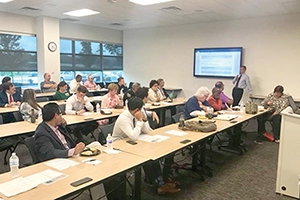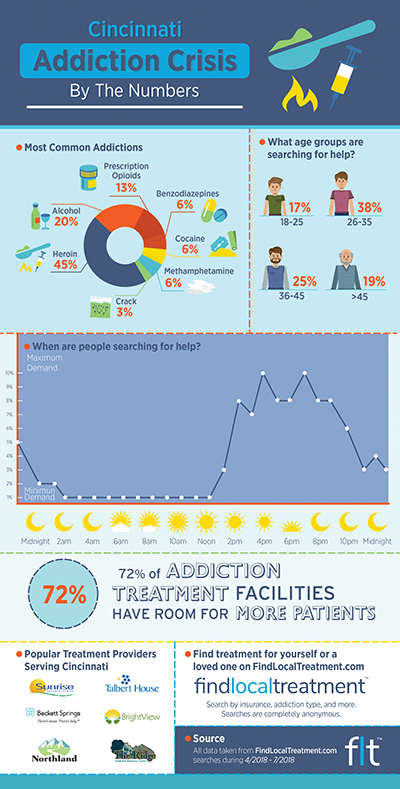By TIM O'NEIL

Dr. Stephen Feagins, vice president of medical affairs for Mercy Health's East Market, gives a presentation at a June meeting of the Mercy Health Addiction Treatment Collaborative in Cincinnati. Mercy Health started the collaborative to form closer links with outpatient addiction treatment facilities in order to help ensure that patients are able to access evidence-based long-term treatment for substance abuse disorders.
Opioid-dependent patients who have recently undergone detoxification are at a heightened risk of accidental overdose and death should they relapse. To counter this risk, doctors at Mercy Health in Cincinnati have been working to more closely link short-term hospital-based detox and emergency care following overdose with outpatient medically assisted treatment to promote long-term recovery.
In 2016, Mercy Health forged an alliance that has connected the health system to over a dozen treatment centers and that network is still growing. The planning work to expand timely access to, and standardization of, outpatient treatment for substance use disorder was operationalized and scaled up last summer in the Cincinnati metro area.

Data in this graphic is based on searches on the FindLocalTreatment.com website. Source: FindLocalTreatment.com
"We can end the scrambling around trying to find places for patients after discharge," said Dr. Larry Graham, president of Mercy Health Behavioral Health Services for Ohio and Kentucky. "When it comes to opiate addiction, a wait list is really a death list."
This spring, Mercy Health Addiction Treatment Collaborative members began posting daily updates on available treatment slots on FindLocalTreatment.com. The website allows prospective patients, their family members, first responders and care coordinators to filter treatment options based on an individual's insurance coverage, substance addiction and timely availability of treatment slots.
Last month, Mercy Health said it was recruiting a second class of Mercy Serves AmeriCorps members to train as addiction navigators. The navigators work with emergency room patients with substance abuse disorders to make sure they can access community-based substance abuse treatment if they are ready to do so.
Dr. Jeffrey Bill, founder and chief executive of the Sunrise Treatment Center in Cincinnati, said Mercy Health is moving to close what he called a "big divide between the two worlds of medical providers and addiction treatment centers." Bill said a major part of that divide is his clients' fears of hospitals.
"Shame and the stigma of addiction often prevent people from seeking medical care they need," Bill said. Through its leadership in the collaborative, Mercy Health is letting people know it is a source of help, he said.
Graham said Mercy Health also is doing its part to eliminate stigma by training staff members to recognize and compassionately treat patients with opioid dependence disorder. It expanded short-term inpatient detox for opioid dependence — the technical term is acute withdrawal management for opioids — from one to all five of its Cincinnati-area hospitals in June. Mercy Health also provides inpatient alcohol detox. Graham said the hospitals did not create dedicated detox units, a decision made in part to normalize the treatment of addiction as a disease, and to provide therapy in the context of a patient's overall medical care plan.
Dr. Navdeep Kang, who oversees behavioral health for Mercy Health in Cincinnati, said most of the system's patients with substance dependence disorder do not arrive by ambulance after overdoses. Rather, Kang said, they are patients admitted for other medical care whose addictions are discovered during treatment. Through the collaborative, Kang said, Mercy Health can refer these patients to treatment centers for ongoing care that best suits their needs.
Mercy Health &mnash; Cincinnati also is expanding to all five hospitals its protocol of screening emergency room patients for symptoms of addiction. Mercy Health began use of the protocol, known as SBIRT — Screening, Brief Intervention and Referral to Treatment — at its Clermont hospital in the outer suburb of Batavia, Ohio. The Clermont campus, home to the Behavioral Health Institute, was the Cincinnati health system's first to offer acute withdrawal management.
Kang said treatment centers taking part in the Mercy Health Addiction Treatment Collaborative have "read-only" access to Mercy Health patients' electronic medical records and they must keep Mercy Health informed of the progress of patients referred for ongoing addiction recovery services, provided the patients agree to that sharing of information. The collaborative aggregates data on how many patients are referred for outpatient treatment, whether they access the treatment, and for how long.
Members of the collaborative meet monthly with Mercy Health to discuss best practices and treatment protocols and to share data and ideas and experience related to improving quality and lowering costs. Dr. Mary Anne Curtiss, medical director of the Cincinnati branch of the Urban Minority Alcoholism and Drug Abuse Outreach Programs of Ohio, said the collaborative allows her staff to swap ideas with treatment centers that primarily serve a suburban demographic. "We're all in the same fight," Curtiss said.
Copyright © 2018 by the Catholic Health Association
of the United States
For reprint permission, contact Betty Crosby or call (314) 253-3490.